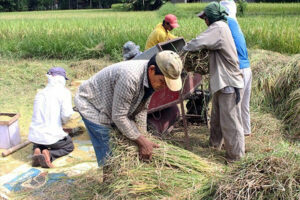THE Rice Competitiveness Enhancement Fund (RCEF) needs to be extended for another six years, with the rice industry yet to show significant improvement in RCEF’s first six years of operation, the Philippine Institute for Development Studies (PIDS) said.
“To introduce flexibility, (we) suggest that, upon the proposal of the President as stated in the National Expenditure Program, we must enable the Congress to alter the allocations of the fund through the General Appropriations Act,” PIDS senior research fellow Roehlano M. Briones and project technical assistant Amerah C. Azis said in a brief.
Under Republic Act No. 11203 or the Rice Tariffication Law of 2019, RCEF receives P10 billion a year from rice import tariff collections to modernize the rice industry by supporting the procurement of machinery, seed, and fertilizer as well as the provision of credit and rice farming know-how.
The RCEF expired last month, but lawmakers are seeking to extend its term and increase its annual allocation.
If extended, RCEF must also include underfunded programs like small water impounding systems, small farm reservoirs, and organic-based fertilizer production by farmer cooperatives and associations, PIDS said.
The government must also create a revolving fund for RCEF’s credit component, it added.
Rice stocks nearly expired but still fit for consumption should also be auctioned off, with its proceeds funding palay (unmilled rice) procurement from domestic farmers, PIDS said.
“This way the NFA (National Food Authority) does not have to rely 100% on the General Appropriations Act budgeting for palay procurement,” it said.
On Monday, Finance Secretary Ralph G. Recto said boosting agricultural productivity is still the government’s long-term solution to the rice industry’s chronically weak performance.
The government lowered rice import tariffs to 15% from 35% via Executive Order (EO) No. 62, as an inflation-containment measure.
As a result, tariff collections for rice are expected to decline by P9.42 billion, PIDS said.
Palay output is expected to decline to 19.14 million tons with the tariff cuts from 19.57 million tons under the previous tariff system, PIDS said.
Farmers have challenged the EO before the Supreme Court, saying they were not consulted properly before its issuance. — Beatriz Marie D. Cruz
